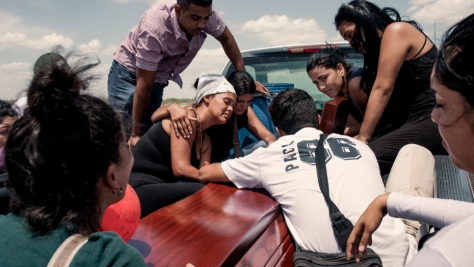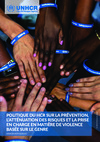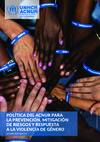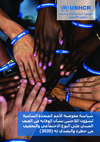UNHCR awards the 2010 Nansen Refugee Award to Alixandra Fazzina
GENEVA, 9 July 2010 - The United Nations High Commissioner for Refugees (UNHCR) today announced the winner of its annual Nansen Refugee Award, British photo-journalist Alixandra Fazzina. Ms. Fazzina was chosen for her tireless dedication to uncovering and portraying the overlooked human consequences of war.
Over the last ten years Alixandra Fazzina has tirelessly documented the plight of the uprooted through distinctive and moving photo reportages. Alixandra Fazzina's work has taken her to Eastern Europe, Africa, the Middle East and Asia to cover human tragedies often neglected by mainstream media.
On winning the Award Alixandra Fazzina said: "I am overwhelmed and absolutely delighted to have been recognized by UNHCR and commended with this distinguished award. Much of my work documents the plight of refugees and the internally displaced and my aim has always been to raise awareness of those forced to flee conflict, violence and misery. To give up one's home and the subsequent struggle to build a new life is one of the hardest challenges anybody can face. Millions every year however have no other choice."
In announcing the Nansen Award, U.N. High Commissioner for Refugees António Guterres said: "Alixandra Fazzina stands out as a fearless humanitarian who achieves something remarkable by unearthing and so vividly portraying individual stories of uprooted people. Her particular talent, her commitment and empathy and her incredible devotion to getting to the bottom of every story makes her an exemplary chronicler of the world's most vulnerable people."
Ms. Fazzina began her career as a photojournalist embedded with the British army in Bosnia. Since then, she has turned her lens from the frontlines to the refugee camps to document the human suffering caused by war. She has been recognized in particular for her coverage of land mine victims in Kosovo, civilians stranded behind enemy lines in Angola, rape as a weapon of war in Sierra Leone, the abuse of children by militias in Congo and Uganda and the refugee situations in Afghanistan and Pakistan.
Ms. Fazzina spent two years in Somalia chronicling the exodus of migrants and refugees from Somalia to the Arabian Peninsula and the smuggling business in the Gulf of Aden. This work resulted in a book, "A Million Shillings, Escape from Somalia", which will be published in September 2010. Risking her life to spend time with people in the squalid shelters along the coast, she captured first hand the despair and suffering of those trying to cross the Gulf of Aden in search of a better life.
The Nansen Refugee Award was created in 1954 in honour of Fridtjof Nansen, Norwegian explorer, scientist and the first U.N. High Commissioner for Refugees. It is given annually to an individual or organisation for outstanding work on behalf of refugees. The Nansen Award consists of a commemorative medal and a US$100,000 monetary prize donated by the governments of Switzerland and Norway. The winner can donate it to a cause of his or her choice.
The Nansen Award Ceremony will take place on 5 October 2010 in Geneva.
-

A final resting place for Venezuelans in Colombia
17 Mar 2021 -

UNHCR Policy on the Prevention of, Risk Mitigation and Response to Gender-based Violence, 2020 (PDF) - French
16 Mar 2021 This Policy consolidates the significant progress made by UNHCR and partners to prevent, mitigate and respond to Gender-based Violence. The policy covers all UNHCR Operations and all people of concern. It applies to all stages of the programme cycle, throughout the displacement continuum, in emergencies and protracted displacement settings, as well as in mixed flows and onward movements, and situations of statelessness. -

UNHCR Policy on the Prevention of, Risk Mitigation and Response to Gender-based Violence, 2020 (PDF) - Spanish
16 Mar 2021 This Policy consolidates the significant progress made by UNHCR and partners to prevent, mitigate and respond to Gender-based Violence. The policy covers all UNHCR Operations and all people of concern. It applies to all stages of the programme cycle, throughout the displacement continuum, in emergencies and protracted displacement settings, as well as in mixed flows and onward movements, and situations of statelessness. -

UNHCR Policy on the Prevention of, Risk Mitigation and Response to Gender-based Violence, 2020 (PDF) - Arabic
16 Mar 2021 This Policy consolidates the significant progress made by UNHCR and partners to prevent, mitigate and respond to Gender-based Violence. The policy covers all UNHCR Operations and all people of concern. It applies to all stages of the programme cycle, throughout the displacement continuum, in emergencies and protracted displacement settings, as well as in mixed flows and onward movements, and situations of statelessness. -

Aid agencies appeal for funding to support over 2 million South Sudanese refugees in dire need
16 Mar 2021 -

UNHCR - Maternal death review guidance and data collection form, 2020 (PDF)
15 Mar 2021 UNHCR is promoting the systematic review of maternal deaths to learn from those situations, improve the quality of safe motherhood programming and prevent future maternal and neonatal morbidity and mortality. Further, the reviews help to identify actions that prevent future shortcomings in access to quality essential maternal and neonatal health services. This form and the accompanying guide are used to systematically assess and document maternal deaths and develop action plans. -

Inside Syria, millions face destitution after a decade of pain
15 Mar 2021 Compounding crises increase misery for Syrian families trying to pick up the pieces after ten years of conflict, including 6.7 million people still displaced inside the country. -

A decade on, Syrian refugees mired in 'silent war' for survival
12 Mar 2021 As the Syria crisis reaches the 10-year mark, millions of refugees face unprecedented hardship due to rising poverty, lack of opportunity and the impact of COVID-19. -

A decade of death, destruction and displacement must not sap our solidarity with Syrians
12 Mar 2021 Statement attributable to Filippo Grandi, UN High Commissioner for Refugees
